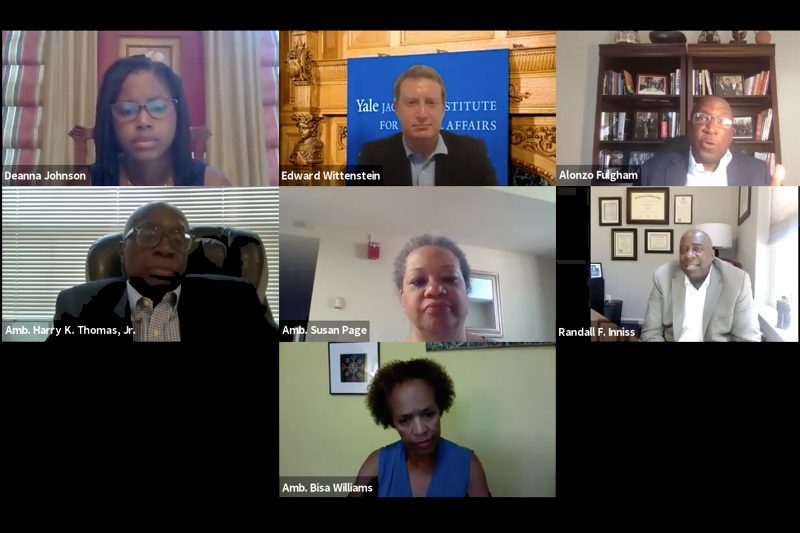Nearly 200 attendees tuned in for Jackson’s online panel discussion, “The Power of Protest: Human Rights at Home and Abroad,” on June 25, 2020.
The discussion, moderated by Ambassador Harry K. Thomas, Jr., Jackson Senior Fellow and former U.S. Ambassador to Zimbabwe, the Philippines, and Bangladesh, and Deanna Johnson, Jackson MA student, included the following guest speakers:
- Alonzo Fulgham, former Chief Operating Officer and Acting Administrator of the U.S. Agency for International Development (USAID)
- Randall F. Inniss, defense attorney, former Director of Security for the National Basketball Association, and New York State Police Trooper
- Ambassador Susan Page, former U.S. Ambassador to South Sudan
- Ambassador Bisa Williams, former U.S. Ambassador to Niger and Deputy Assistant Secretary of State for Western Hemisphere Affairs
During the panel, participants discussed the current protests and events surrounding the murders of Breonna Taylor, Rayshard Brooks, and George Floyd, among others and how they may translate into policy change both within the United States and abroad.
Ambassador Page highlighted the importance of US accountability and noted that the present events should be part of a “moment of self-criticism” as the United States strives to create “a more perfect union.” She also mentioned the importance of working within the legal and constitutional frameworks of other nations to carry out effective foreign policy that addresses inequalities and protects human rights.
Fulgham discussed the importance of Black policymakers in constructing creative, culturally appropriate, and sustainable solutions to the world’s biggest issues. He also underscored the importance of collaboration and cooperation in foreign policy approaches and states that Black practitioners must be trained to have a seat at the table because “they are going to be just as effective as their white colleagues.”
Ambassador Williams mentioned that institutions should make “diversity a reality in every sector of life.” She also indicated that policy schools and programs should expand the practical approaches typically employed to solving issues. “We need to talk to the farmer as well as to the university professor or the analyst,” she said, because by including the voices of those directly affected, the policies developed will be more effective and appropriate.
Inniss discussed the role of security and police departments, noting the differences in defunding and deconstructing police forces. He gave examples of how funds produced from defunding efforts may be used for social workers and other professionals. Inniss also cited the example of the country of Georgia, which dismantled its own police force and slowly hired a new force.
Panelists also discussed the role of private companies in the current movement as well as community and activist leadership, US credibility abroad, and similarities between the Black Lives Matter protests and the Hong Kong protests.
